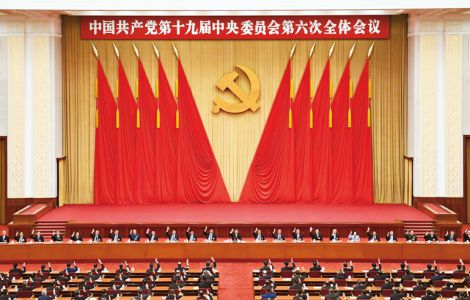中英对照:中共中央关于党的百年奋斗重大成就和历史经验的决议 [3]
Resolution of the Central Committee of the Communist Party of China on the Major Achievements and Historical Experience of the Party over the Past Century [3]
十月革命一声炮响,给中国送来了马克思列宁主义。五四运动促进了马克思主义在中国的传播。在中国人民和中华民族的伟大觉醒中,在马克思列宁主义同中国工人运动的紧密结合中,一九二一年七月中国共产党应运而生。中国产生了共产党,这是开天辟地的大事变,中国革命的面貌从此焕然一新。
With the salvoes of Russia’s October Revolution in 1917, Marxism-Leninism was brought to China. The May 4th Movement of 1919 spurred the spread of Marxism throughout the country. Then in July 1921, as the Chinese people and the Chinese nation were undergoing a great awakening and Marxism-Leninism was becoming closely integrated with the Chinese workers’ movement, the Communist Party of China was born. The founding of a communist party in China was an epoch-making event, and from then on the Chinese revolution took on an entirely new look.
党深刻认识到,近代中国社会主要矛盾是帝国主义和中华民族的矛盾、封建主义和人民大众的矛盾。实现中华民族伟大复兴,必须进行反帝反封建斗争。
The Party was keenly aware that the conflicts between imperialism and the Chinese nation, and those between feudalism and the people constituted the principal contradiction in modern Chinese society. To realize national rejuvenation, it would be essential to initiate an anti-imperialist and anti-feudal struggle.
建党之初和大革命时期,党制定民主革命纲领,发动工人运动、青年运动、农民运动、妇女运动,推进并帮助国民党改组和国民革命军建立,领导全国反帝反封建伟大斗争,掀起大革命高潮。
In the early days of the Party and during the Great Revolution, the Party formulated the program of the democratic revolution, launched movements of workers, youths, peasants, and women, promoted and supported the reorganization of the Chinese Kuomintang (KMT) and the founding of the National Revolutionary Army, and led the great anti-imperialist and anti-feudal struggle across the country, bringing about a surge in the Great Revolution.
一九二七年国民党内反动集团叛变革命,残酷屠杀共产党人和革命人民,由于党内以陈独秀为代表的右倾思想发展为右倾机会主义错误并在党的领导机关中占了统治地位,党和人民不能组织有效抵抗,致使大革命在强大的敌人突然袭击下遭到惨重失败。
In 1927, the reactionary clique within the KMT betrayed the revolution, brutally massacring communists and other revolutionaries. Meanwhile, the Right deviationist ideas within the Party represented by Chen Duxiu grew into Right opportunist errors and came to dominate the Party’s leadership. The Party and the people were unable to mount an effective resistance, resulting in a disastrous defeat for the Great Revolution under the surprise attack of a powerful enemy.
土地革命战争时期,党从残酷的现实中认识到,没有革命的武装就无法战胜武装的反革命,就无法夺取中国革命胜利,就无法改变中国人民和中华民族的命运,必须以武装的革命反对武装的反革命。
During the Agrarian Revolutionary War, the Party realized in light of harsh realities that without revolutionary armed forces, it would be impossible to defeat armed counter-revolutionaries, win the Chinese revolution, and thus change the fate of the Chinese people and the Chinese nation. The Party would need to fight armed counter-revolution with armed revolution.
南昌起义打响武装反抗国民党反动派的第一枪,标志着中国共产党独立领导革命战争、创建人民军队和武装夺取政权的开端。八七会议确定实行土地革命和武装起义的方针。党领导举行秋收起义、广州起义和其他许多地区起义,但由于敌我力量悬殊,这些起义大多数失败了。事实证明,在当时的客观条件下,中国共产党人不可能像俄国十月革命那样通过首先占领中心城市来取得革命在全国的胜利,党迫切需要找到适合中国国情的革命道路。
The Nanchang Uprising of 1927 fired the opening shot of armed resistance against KMT reactionaries. This marked the start of the Communist Party of China’s journey to lead the revolutionary struggle independently, build the people’s armed forces, and seize state power by force. Soon afterwards, the policy of carrying out agrarian revolution and organizing armed uprisings was established at the August 7th Meeting. The Party led the Autumn Harvest Uprising, the Guangzhou Uprising, and uprisings in many other areas. Due to the great disparity in strength between the enemy forces and our own, most of these uprisings ended in failure. The fact of the matter was that in view of objective conditions at the time, the Chinese communists could not follow the example of Russia’s October Revolution and win nationwide revolutionary victory by taking key cities first. The Party urgently needed to find a revolutionary path compatible with China’s actual conditions.
从进攻大城市转为向农村进军,是中国革命具有决定意义的新起点。毛泽东同志领导军民在井冈山建立第一个农村革命根据地,党领导人民打土豪、分田地。古田会议确立思想建党、政治建军原则。随着斗争发展,党创建了中央革命根据地和湘鄂西、海陆丰、鄂豫皖、琼崖、闽浙赣、湘鄂赣、湘赣、左右江、川陕、陕甘、湘鄂川黔等根据地。党在国民党统治下的白区也发展了党和其他革命组织,开展了群众革命斗争。
The shift from attacking big cities to advancing into rural areas was a new starting point of decisive importance in the Chinese revolution. Led by Comrade Mao Zedong, soldiers and civilians established the first rural revolutionary base in the Jinggang Mountains, where the Party led the people in overthrowing local despots and redistributing the land. The Gutian Meeting of 1929 established the principles of strengthening the Party ideologically and the military politically. As progress was made in the struggle, the Party established the Central Revolutionary Base as well as the Western Hunan-Hubei, Haifeng-Lufeng, Hubei-Henan-Anhui, Qiongya, Fujian-Zhejiang-Jiangxi, Hunan-Hubei-Jiangxi, Hunan-Jiangxi, Zuojiang-Youjiang, Sichuan-Shaanxi, Shaanxi-Gansu, and Hunan-Hubei-Sichuan-Guizhou bases. In addition, the Party also set up Party organizations and other revolutionary organizations in KMT-controlled areas and launched revolutionary mass struggles.
然而,由于王明“左”倾教条主义在党内的错误领导,中央革命根据地第五次反“围剿”失败,红军不得不进行战略转移,经过艰苦卓绝的长征转战到陕北。“左”倾路线的错误给革命根据地和白区革命力量造成极大损失。
However, the fifth counter-encirclement and suppression campaign in the Central Revolutionary Base ended in failure as a result of the misguided leadership of Wang Ming’s “Left” dogmatism within the Party. The Red Army was forced to make a strategic shift, and arrived in northern Shaanxi Province after enduring the extraordinarily bitter and arduous journey of the Long March. The errors of the “Left” line caused enormous losses to revolutionary bases as well as revolutionary forces in KMT-controlled areas.
一九三五年一月,中央政治局在长征途中举行遵义会议,事实上确立了毛泽东同志在党中央和红军的领导地位,开始确立以毛泽东同志为主要代表的马克思主义正确路线在党中央的领导地位,开始形成以毛泽东同志为核心的党的第一代中央领导集体,开启了党独立自主解决中国革命实际问题新阶段,在最危急关头挽救了党、挽救了红军、挽救了中国革命,并且在这以后使党能够战胜张国焘的分裂主义,胜利完成长征,打开中国革命新局面。这在党的历史上是一个生死攸关的转折点。
In January 1935, the Political Bureau of the Central Committee convened a meeting in Zunyi on the Long March, at which Comrade Mao Zedong was confirmed as the de facto leader of the Central Committee and the Red Army. The meeting laid the groundwork for establishing the leading position within the Central Committee of the correct Marxist line chiefly represented by Comrade Mao Zedong, as well as for the formation of the first generation of the central collective leadership with Comrade Mao Zedong at its core. The meeting opened a new stage in which the Party would act on its own initiative to address practical problems concerning the Chinese revolution, and saved the Party, the Red Army, and the Chinese revolution at a moment of greatest peril. It also subsequently enabled the Party to defeat Zhang Guotao’s separatism, bring the Long March to a triumphant conclusion, and open up new horizons for the Chinese revolution. The Zunyi Meeting is therefore considered a pivotal turning point in the Party’s history.
抗日战争时期,九一八事变后,中日民族矛盾逐渐超越国内阶级矛盾上升为主要矛盾。在日本帝国主义加紧侵略我国、民族危机空前严重的关头,党率先高举武装抗日旗帜,广泛开展抗日救亡运动,促成西安事变和平解决,对推动国共再次合作、团结抗日起了重大历史作用。
After the September 18th Incident in 1931 during the War of Resistance against Japanese Aggression, the conflict between China and Japan gradually overtook domestic class conflict as the issue of primary importance. As Japanese imperialists intensified their aggression against China, the country was plunged into an unprecedented national crisis. The Party was the first to propose that China should fight Japanese aggression with armed resistance, and launched extensive resistance movements. It also facilitated a peaceful settlement of the Xi’an Incident, thus playing a historic role in promoting a second period of cooperation between the KMT and the CPC and the united resistance against Japanese aggression.
注:为确保中英对照准确,“热词译”网站可能对中英文重新分段。

